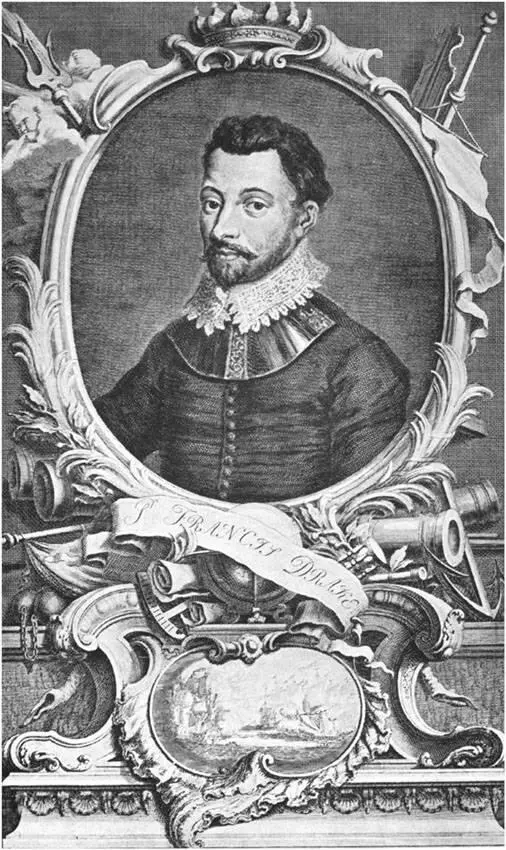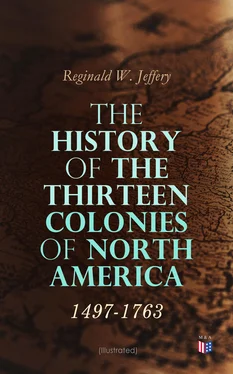It was, however, the discovery of America, and in particular of the North-West Passage, that offered great inducements to Englishmen. The American continent had an ever fascinating attraction, for the reports of its vast wealth drew adventurous spirits as with a magnet. The gold of Mexico and Peru dazzled their eyes and made them hope to find some similar hoard on every barren strip of shore from Patagonia to Newfoundland. "It was thought that in those unknown lands, peopled by 'anthropophagi and men whose heads did grow beneath their shoulders,' lay all the treasures of the earth. That was an irresistible temptation to the great merchants of England, citizens of no mean city, pursuing no ignoble nor sordid trade." 17Thus early in the reign of Elizabeth there was an attempt at American plantation; it certainly was only an attempt, for it in no way furthered the schemes of colonisation. Thomas Stukeley, a member of a good Devonshire family, planned, with the sanction of the queen, in 1563, to colonise Florida. He made the fatal mistake of so many others, of converting a colonising expedition into one of mere buccaneering. Spanish and French vessels were his real objects, not the foundation of an English settlement in the New World. The scheme naturally failed; and Stukeley removed his activities to Barbary, where he met a glorious death amongst the chivalry of Portugal upon the classic field of Alcazar.
The search for the North-West Passage was even more tempting than the projection of imaginary colonies in the South; it opened before the eyes of speculative voyagers a promise of all the wealth of the East. A large proportion of Hakluyt's great prose epic—that marvellous work of adventure—is filled with the search for Cathay. That mystic land became the purpose and the goal of hundreds of seamen who, during the centuries, struggled and toiled through overwhelming perils, ever to be baffled by the solid and impenetrable ice. Those wild north seas seem to have caused little terror to the Tudor sea-dogs; Master Thorne, for example, deserves to live in the memory of Englishmen for all time simply for one remark with which he is credited. When the objection of the ice was proposed to him, he waived it on one side with words which might well be taken as the motto of the British Empire: "There is no land unhabitable and no sea innavigable." 18Sir Humphrey Gilbert, in particular, tried to encourage men to push forward in their adventurous discoveries, and there is no doubt that his famous work, A Discourse to prove a passage by the North West to Cathaya and the East Indies , did a great deal to stimulate men in their hopeless task.
It was largely due to this Discourse that Martin Frobisher sailed to find the tantalising passage, in June 1576, under the patronage of the all-powerful Earl of Warwick. He sighted Greenland, and then reached that inlet on the American coast which he called Frobisher Bay. He brought back with him samples of a black stone which were supposed to contain gold, and thus added the temptation of easily acquired wealth to the sufficiently delusive and dangerous task of discovering the passage. The possibility of mineral wealth in the Arctic Regions brought about the formation of the Company of Cathay, under the government of Michael Lok; and as its Captain-General, Frobisher undertook a second voyage in May 1577. His object was "the further discovering of the passage to Cathay, and other Countreys, thereunto adjacent, by West North-West navigations: which passage or way is supposed to be on the North and North-West part of America ... where through our Merchants may have course and recourse with their merchandise." 19Frobisher took possession of the barren territory, and on his return Queen Elizabeth "named it very properly Meta Incognita, as a marke and bound utterly hitherto unknown." 20The gold-refiners of London were still deceived by the black stones; and again Frobisher sailed, in May 1578, to work this imaginary mine. He took with him on this occasion "a strong fort or house of timber" for the shelter of "one hundreth persons, whereof 40 should be mariners for the use of ships, 30 Miners for gathering the gold Ore together for the next yere, and 30 souldiers for the better guard of the rest, within which last number are included the Gentlemen, Gold finers, Bakers, Carpenters & all necessary persons." 21This might be regarded as an early attempt to found a colony, for Frobisher seems to have hoped to establish a thriving industry in this desolate and ice-bound land; but as a matter of fact these "necessary persons" did nothing at all except to discover an island which existed only in their imaginations, and they returned to England in the autumn. Frobisher's efforts as a discoverer now ceased; for his seamanship and courage were required in home waters for the protection of his native land.
Sir Humphrey Gilbert, half-brother of Raleigh, was the "first of our nation that carried people to erect an habitation and government in those northerly countreys of America." 22He was a man bold in action and chivalrous in character; he was one of those giants of the Elizabethan period, and if he had any faults they were only those of his age, while his virtues were all his own. As early as 1563 he was connected with schemes for colonisation in the formation of a company for the discovery of new trades. He it is who has the proud position of being the founder of our premier colony, Newfoundland. In 1578, letters patent were granted to him by Queen Elizabeth for establishing a colony in North America. He made his first voyage in that year, sailing from Dartmouth in September. The expedition was a complete failure, and fearing lest his patent should expire, he undertook that voyage which has made him one of the most famous men in history. In 1583 he sailed to Newfoundland, and took possession in the name of the Virgin Queen, "and signified unto al men, that from that time forward, they should take the same land as a territorie appertaining to the Queene of England." 23His great action was not allowed to be forgotten; the gallant knight himself never saw England again, but passed to his grave beneath the rough waters of the Atlantic. Hakluyt, however, printed the story of an eye-witness, Edward Hayes, who gave a graphic account of the whole expedition. Gilbert insisted on returning in the Squirrel , a small crazy craft, rather than in the larger vessel, known as the Hinde . The weather became very foul; and on Monday afternoon, the 9th of September, Hayes says, "the frigate was neere cast away oppressed by the waves, yet at that time recovered: and giving foorth signes of joy the Generall, sitting abaft with a booke in his hand cried out unto us in the Hind (so oft as we did approach within hearing) We are as neere to heaven by sea as by land." About twelve that night, the frigate being ahead of the Hinde, her suddenly went out; and after a minute's awful silence, the men of the Hinde exclaimed, "the General was cast away." 24Thus the hero, strong in his belief and fear of God, with chivalrous and stainless name, found his last resting-place in the sea. He was a forerunner of the very noblest type, an example to the men of his own generation, and to those fearless adventurers who have helped to create the British Empire in all parts of the world.

SIR FRANCIS DRAKE
FROM AN ENGRAVING BY J. HONBRAKEN IN THE BRITISH MUSEUM.
The northern portions of America were for the most part more easily accessible to the English, and the dangers of Spanish and Portuguese attacks were more remote. The West Indies, however, and even South America, were not without their fascination, and many Englishmen made voyages to those parts, not so much for the purposes of discovery as for trade, buccaneering, and booty. The earliest of these West Indian trading voyages was that of Thomas Tison, who, it is known, sailed to the West, some time previous to the year 1526. He dwelt on one of the West Indian Islands as a secret factor for some English merchants; and "it is probable that some of our marchants had a kinde of trade to the West Indies even in those ancient times and before also: neither doe I see," says Hakluyt, "any reason why the Spaniards should debarre us from it at this present." 25As a trader, pirate, and slave-dealer, Sir John Hawkins made three celebrated voyages in 1562, 1564, and 1568, between Guinea and the West Indies. On one of these he was accompanied by Francis Drake, who was destined for far greater things than slave-dealing. After many adventures off the Spanish main, Drake, in the spirit of a Crusader, started on his momentous voyage round the world. In a small vessel called the Golden Hinde or Pelican , with a still smaller ship, the Elizabeth , the great seaman sailed from Plymouth in February 1577. Sailing down the South American coast, he at last arrived at the Straits of Magellan, where one of his company, Master Thomas Doughty, mutinied and was executed. After being deserted by the Elizabeth , the voyage proceeded along the shores of Chili and Peru; and passing still farther north, it is probable that Drake discovered "that portion of North America now known as Oregon, and anticipated by centuries the progress of English colonisation: the New Albion, which he took over from the Indians, being probably the British Columbia of to-day." 26Drake's return was made without any very serious mishaps, and he dropped anchor in Plymouth Sound in November 1580. It was a fine exploit, and roundly applauded throughout the country. No one, however, realised at that time, nor indeed for generations to come, that Drake had discovered and annexed what was afterwards to become so large a portion of the British dominions beyond the seas.
Читать дальше













